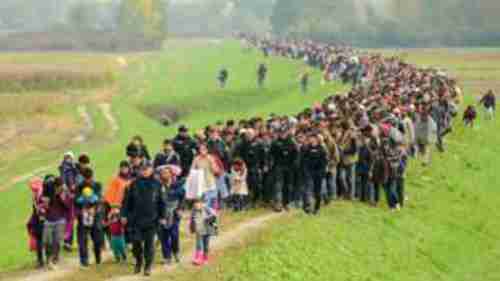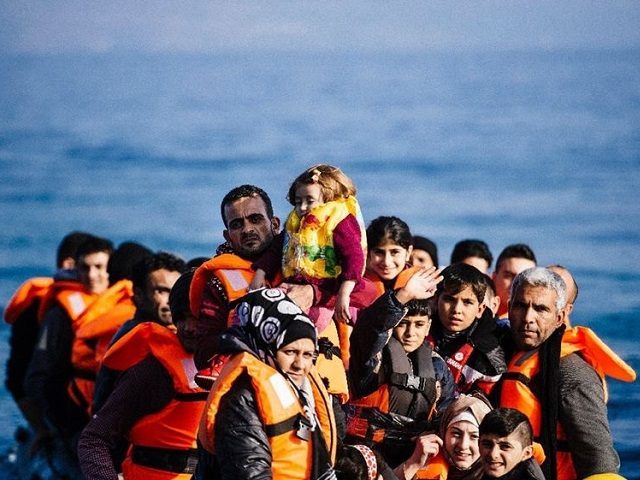This morning’s key headlines from GenerationalDynamics.com
- More EU countries threaten border closings, as refugee crisis worsens
- Risk of new housing bubble collapse continues to grow
- Illinois starts paying IOUs instead of lottery winnings
More EU countries threaten border closings, as refugee crisis worsens

Migrants arriving in Slovenia from Croatia on Friday (AFP)
Cold weather has not slowed the numbers of migrants, especially from Syria, Iraq and Afghanistan, as EU officials had hoped. A record 5,800 crossed from Macedonia into Serbia in one day this month. The flow of migrants seems to be increasing, out of fear that all the borders will soon be closed. Some 58,000 migrants arrived in Slovenia in the last week alone, overwhelming the country’s resources. The danger that thousands of migrants will be trapped in the winter cold is increasing, as we described a few days ago. ( “20-Oct-15 World View — As winter approaches, thousands of European refugees may be trapped in the cold”)
Three west Balkan countries, Bulgaria, Serbia and Romania, are threatening to close their borders completely. Bulgaria’s Prime Minister Boiko Borisov announced:
The three countries, we are standing ready, if Germany and Austria close their borders, not to allow our countries to become buffer zones. We will be ready to close borders.
European Commission President Jean-Claude Jüncker has called an extraordinary meeting of EU leaders, including leaders from Austria, Bulgaria, Croatia, Macedonia, Germany, Greece, Hungary, Romania, Serbia and Slovenia. According to Jüncker, “They will discuss urgently needed, common operative answers to the current humanitarian demands and decide on short-term measures.”
German media have reported that Jüncker will present a 16-point plan, including an undertaking not to send migrants from one country to another without prior agreement. Other proposals in the plan are expected to be speeding up procedures to speed up asylum procedures and deportation for migrants.
It is also believed that there will be proposals for humanitarian aid for migrants trapped in the cold. Reuters and BBC and Reuters
Risk of new housing bubble collapse continues to grow
The National Mortgage Risk Index (NMRI), which measures (inversely) the stability and health of the real estate markets, has increased every month since January 2014, meaning that the real estate markets are becoming less stable and less healthy, as they did in the mid-2000s decade, prior to the collapse of the housing bubble.
Some of the findings in the report by the American Enterprise Institute are:
- Credit requirements for first-time buyers are being weakened, just as in the creation of the mid-2000s housing bubble. The same abusive practices that were common with subprime mortgages are recurring. For example, in September, 70% had down payments less than or equal to 5%.
- Fueled by historically low mortgage rates and growing leverage from low down payments, real home prices have been increasing rapidly for 36 straight months, 12.5% higher today than in 2012, far outstripping income growth and crimping affordability.
- The Federal Housing Authority (FHA) cut its annual insurance premiums early this year, as a kind of social program to make houses more affordable. However, instead of increasing affordability, the insurance premium cut has largely resulted in the purchase of higher priced homes.
According to the report:
The typical first-time buyer today puts little money down and chooses a mortgage that pays off very slowly. This combination means that many first-time buyers are only one recession away from being significantly underwater.
I have my own painful memories of last housing bubble in the mid-2000s decade. There were some friends that I implored not to buy houses, but they did anyway. After the bubble burst, it was heartbreaking to seem them financially destroyed. It will to happen again, and it will not be pleasant. American Enterprise Institute
Illinois starts paying IOUs instead of lottery winnings
You can still buy lottery tickets in Illinois, but don’t count on winning much. Illinois announced last week that it won’t pay out any lottery winnings above $600.
This is the second such announcement in three months. In August, Illinois announced that it wouldn’t pay out any lottery winnings above $25,000.
The way lotteries are supposed to work is as follows: Lots of people buy tickets, and all that purchase money goes into a bank account. Then the lottery winners are paid out of the same bank account.
Apparently Illinois has decided to confiscate the purchase money.
These are the kinds of things that are impossible, can’t possibly happen, until they happen. In recent years, Europe has confiscated some people’s bank accounts in Greece and Cyprus. That was supposed to be impossible as well. That’s why people in some countries avoid banks and hide their money under their mattresses. CNN Money and Fortune
KEYS: Generational Dynamics, European Union, Jean-Claude Jüncker, Bulgaria, Boiko Borisov, Serbia, Romania, National Mortgage Risk Index, NMRI, Illinois, lottery, Greece, Cyprus
Permanent web link to this article
Receive daily World View columns by e-mail

COMMENTS
Please let us know if you're having issues with commenting.